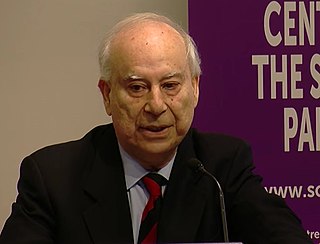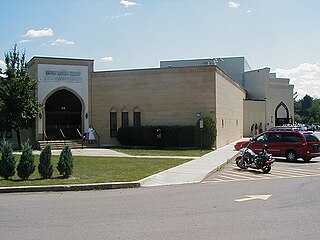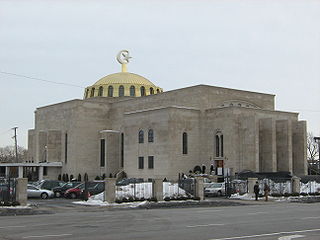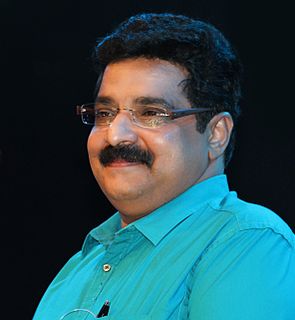Islamic Association of Palestine was an organization accused of raising money in the United States for Hamas established in 1981 and defunct since 2004. It described itself as "a not-for-profit, public-awareness, educational, political, social, and civic, national grassroots organization dedicated to advancing a just, comprehensive, and eternal solution to the cause of Palestine and suffrages of the Palestinians." For a time it also used the name American Muslim Society (AMS) and operated as the American Middle Eastern League for Palestine (AMEL).

Islam is the 3rd largest religion in the United States, behind Christianity and Judaism. A 2017 study estimated that 3.45 million Muslims were living in the United States, about 1.1 percent of the total U.S. population. In 2017, 20 states which were mostly in the South and Midwest reported Islam being the largest non-Christian religion. In 2020, the U.S. Religion Census found there to be 4.45 million Muslims in the country, making up 1.3% of the population.

Ingrid Mattson is a Canadian activist and scholar, A professor of Islamic studies, she is currently the London and Windsor Community Chair in Islamic Studies at Huron University College at the University of Western Ontario in London, Ontario, Canada. Mattson is a former president of the Islamic Society of North America (ISNA) and was described as "Perhaps the most noticed figure among American Muslim women" in a 2010 New York Times article.
Farid, also spelt Fareed or Ferid and accented Férid, is an Arabic and Persian masculine personal name or surname meaning "unique, singular, incomparable". For many communities, including in the Middle East, the Balkans, North Africa, and South East Asia, the name Fareed is common across generations.
The Mosque Cares is a non-profit Islamic da'wah project founded by Imam Warith Deen Muhammad (1933–2008), a former leader of the Nation of Islam and a son and successor to its first Supreme Minister Elijah Muhammad (1897–1975).

The Islamic Society of North America (ISNA) is a nonprofit organization based in Plainfield, Indiana. It provides a number of programs and services to the Muslim community and broader society. ISNA holds an annual convention which is generally regarded as the largest annual gathering of Muslims in the US.
The Fiqh Council of North America is an association of Muslims who interpret Islamic law on the North American continent. The FCNA was founded in 1986 with the goal of developing legal methodologies for adopting Islamic law to life in the West.
Walid Phares is a Lebanese-born American scholar and conservative political pundit.

Ekmeleddin Mehmet İhsanoğlu is a Turkish academic, diplomat and politician who was Secretary-General of the Organisation of Islamic Cooperation (OIC) from 2004 to 2014. He is also an author and editor of academic journals and advocate of intercultural dialogue.
Taqwacore is a subgenre of punk music dealing with Islam, its culture, and interpretation. Originally conceived in Michael Muhammad Knight's 2003 novel, The Taqwacores, the name is a portmanteau of "hardcore" and the Arabic word "taqwa" (تقوى), which is usually translated as "piety" or the quality of being "God-fearing", and thus roughly denotes reverence and love of the divine. The scene is composed mainly of young Muslim artists living in the US and other Western countries, many of whom openly reject traditionalist interpretations of Islam, and thus live their own lifestyle within the religion or without.

Michael Muhammad Knight is an American novelist, essayist, and journalist. His writings are popular among American Muslim youth. The San Francisco Chronicle described him as "one of the most necessary and, paradoxically enough, hopeful writers of Barack Obama's America," while The Guardian has described him as "the Hunter S. Thompson of Islamic literature," and his non-fiction work exemplifies the principles of gonzo journalism. Publishers Weekly describes him as "Islam's gonzo experimentalist." Within the American Muslim community, he has earned a reputation as an ostentatious cultural provocateur.
Louay M. Safi is a Syrian-American, a scholar of Islam and the Middle East, and an advocate of Arab and Muslim American rights. He published on such issues as social and political development, modernization, democracy, human rights, and Islam and Modernity. He is the author of 11 books and numerous papers, and speaker on questions of leadership, democracy, Islam, and the Middle East. He is also a spokesperson for the Syrian National Coalition, a league of Syrian opposition groups fighting Syrian President Assad, which was formed in November 2012 in Doha, Qatar.
Dr. Sayyid M. Syeed is the former President and former national director for the Office for Interfaith and Community Alliances for the Islamic Society of North America (ISNA), a national umbrella organization which has more than 300 affiliates across the United States and Canada.

Akbar Salahuddin Ahmed, is a Pakistani-American academic, author, poet, playwright, filmmaker and former diplomat. He currently is a professor of International Relations and holds the Ibn Khaldun Chair of Islamic Studies at the American University, School of International Service in Washington, D.C. Akbar Ahmed served as the Pakistan High Commissioner to the UK and Ireland. He currently is a Global Fellow at the Woodrow Wilson Center.

Islamic Association of Greater Detroit (IAGD) was founded in 1978 by immigrants from South Asia and the Middle East. After IAGD was formed, it purchased the current property situated in the city of Avon Township. Eventually, the city name changed to Rochester Hills, Michigan. On this property was a "Blue House" which was used as a meeting place and Sunday Islamic School. As the community grew and during the construction of the original mosque, IAGD rented the Larson Middle School in Troy, Michigan for its Sunday School as well as community dinners. IAGD has had a tradition of holding a community dinner on the first Saturday of each month for the past 30 years. The original mosque included a prayer space, social hall, and kitchen. IAGD moved into the newly built facility in 1982.
Kareem Irfan became Chairman of the Council of Islamic Organizations of Greater Chicago (CIOGC) in January 2001 and held the position until December 2007. The CIOGC is a broad-based federation that serves over 400,000 Muslim Americans. Prior to 2001, he was involved in a number of council projects, co-chairing its Bosnian Refugee Relocation Project and chairing its Media Relations Committee.

The American Society of Muslims was a predominantly African-American association of Muslims which was the direct descendant of the original Nation of Islam. It was created by Warith Deen Mohammed after he assumed leadership of the Nation of Islam upon the death of his father Elijah Muhammad. Imam W. Deen Mohammed changed the name of the Nation of Islam to the "World Community of Islam in the West" in 1976, then the "American Muslim Mission" in 1981, and finally the "American Society of Muslims".

M. K. Muneer is an Indian politician, physician, social worker, singer, poet and author from Kerala. He was the Minister for Social Welfare and Panchayat in the last UDF Ministry, headed by Oommen Chandy and represented the Kozhikode South constituency in the legislative assembly. He was also the Minister for Public Works in A K Antony Ministry 3. Muneer is a State secretary of the Indian Union Muslim League and was the Chairman of the Malayalam TV channel Indiavision. He has written ghazals and books including Fascism and the Sangh Parivar. He is a qualified medical doctor and patron of MCC-THAS-Haemophilia Society.

The Ẓāhirīmadhhab or al-Ẓāhirīyyah is a Sunnī school of Islamic jurisprudence founded by Dāwūd al-Ẓāhirī in the 9th century CE. It is characterized by strict adherence to literalism and reliance on the outward (ẓāhir) meaning of expressions in the Quran and ḥadīth literature; the consensus (ijmāʿ) of the first generation of Muhammad's closest companions (ṣaḥāba), for sources of Islamic law (sharīʿa); and rejection of analogical deduction (qiyās) and societal custom or knowledge (urf), used by other schools of Islamic jurisprudence.









